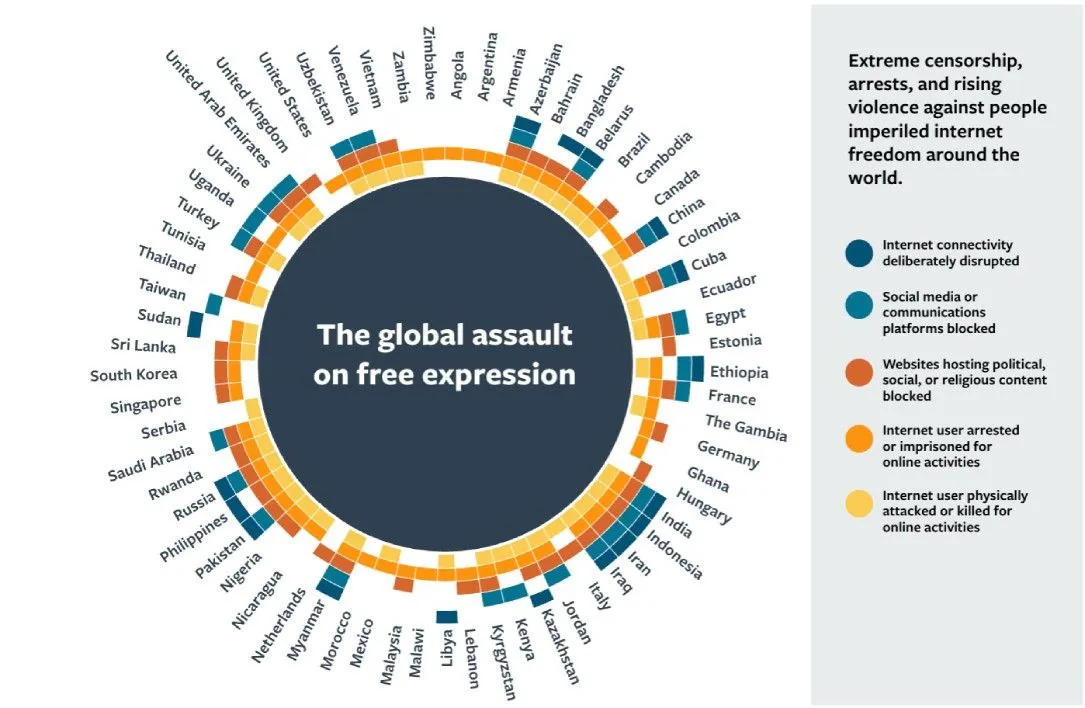More than two dozen countries have used internet outages to sway elections: report
Forty-three governments worldwide have attacked or killed citizens for their online speech and 25 have cut off internet access during election periods, metrics which contributed to an overall decline in internet freedoms in 2024, a new report says.
In at least 56 countries, internet users were arrested for their political, religious and social views, according to the report published Wednesday by Freedom House, a nonprofit promoting democratic values.
The organization has produced a report assessing internet freedoms since 2009 and said they declined for the 14th consecutive year in 2024.
Freedom House assessed 72 countries’ practices — covering 87% of global internet users — to produce the report, which found that more countries are now physically harming internet users than ever before.
Election-related censorship and disinformation is also a problem, according to the report, which found that at least 25 of 41 countries holding elections blocked internet and social media access or cut off websites allowing political, social and religious content.
In at least 21 of the 41 election-holding countries, commentators promoting the government in power manipulated online content in an effort to sway election results or create distrust, the report says.
Journalists and independent researchers were unable to effectively report on the problem due to government interference and fewer tools from social media platforms to aid in studying online manipulation, the report said.
“Each year, free expression online is getting more and more restricted around the world, regardless of countries, whether they're free, partly free or not free,” said Allie Funk, research director for technology and democracy at Freedom House. “It's a right that continuously is under attack.”
Governments have found increasingly sophisticated tools for curtailing online freedoms, including through the use of surveillance and censorship that is harder to track, she said.
The recently finalized United Nations cybercrime treaty is a threat to free expression online, Funk added, saying that Freedom House is urging countries worldwide to block its passage.
Online human rights protections decreased in 27 of 72 countries studied with Kyrgyzstan, Azerbaijan, Belarus, Iraq and Zimbabwe posting the largest declines, the report says.
Myanmar and China are the least digitally free countries in the world, according to the report, which blamed a crackdown on dissenting voices from the military junta running Myanmar for the poor showing.

Image: Freedom House
Many political campaigns used generative AI during major elections held in the time period the report covered, which ranged from May 2023 to June 2024.
In some cases bad actors exploited generative AI to disseminate false information, the report said, but it added that the technology is hard to detect, complicating efforts to study its use.
The report includes recommendations for policymakers and technology companies. They include:
- Promoting information and speech freedoms by allowing access to internet services and digital platforms, especially in election seasons or amid conflict.
- Nurturing a quality online ecosystem by supporting local media and offering civic education.
- Investing more in integrity and trust and safety while also hiring human rights experts for each country the companies operate in.
- Strongly protecting against surveillance technology and standardizing end-to-end encryption.
- Treating a free and open internet as a democratic institution and coordinating with other democracies to bolster internet freedoms globally.
Suzanne Smalley
is a reporter covering digital privacy, surveillance technologies and cybersecurity policy for The Record. She was previously a cybersecurity reporter at CyberScoop. Earlier in her career Suzanne covered the Boston Police Department for the Boston Globe and two presidential campaign cycles for Newsweek. She lives in Washington with her husband and three children.



